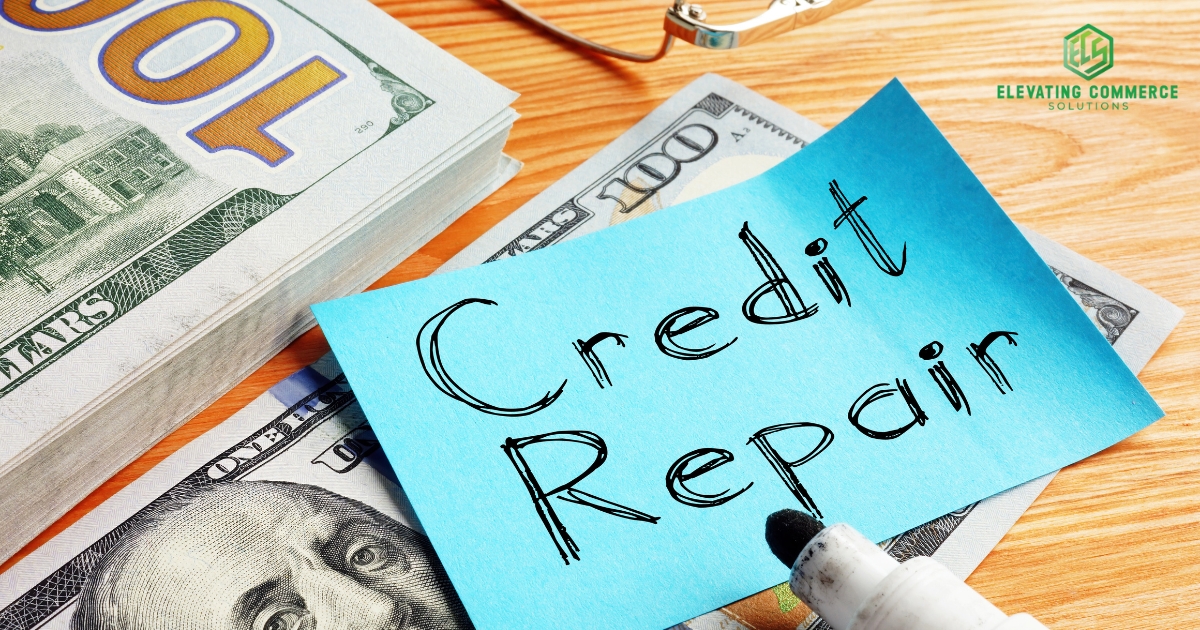
Starting or running a business takes more than passion and hard work. Your credit score is the first step to proving your financial reliability, which is very important for your success.
Having strong credit is important for business owners, not simply for getting a credit card or personal loan. It might have a direct impact on your business. Banks and investors may not trust you if your credit history indicates late payments, defaults, or excessive balances. But if you have strong credit, you may receive more money, better loan terms, and develop a stable firm for the long term.
This blog post talks about why entrepreneurs need to fix their credit repair and how raising their credit score can help their business flourish.
How Your Credit Affects Your Business Credit
Before you start fixing your credit, you should know how it affects your business:
- Funding for a new business: Most business owners utilize personal credit to secure their first funding because their business doesn’t have a credit history yet.
- Small Business Loans: When you ask for a loan for your business, banks usually look at your credit score.
- Relationships with vendors: If suppliers and vendors don’t trust your funds, they might not give you good payment terms.
- Credit Cards for Businesses: Your credit score typically determines whether or not you can receive a business credit card and how much you can borrow.
This illustrates that the way you handle money affects your business. A low credit score could make it harder for you to get loans, raise your interest rates, and limit your chances to grow.
Why Having Good Credit is Important for Business Owners
Here are the primary reasons why entrepreneurs need to fix and keep their credit in good shape:
1. Getting money for your business
Your firm runs on cash flow. You typically need extra money to pay your employees, buy equipment, or pay for marketing. Lenders check your credit score to see if they can trust you. A high score can benefit you:
- Get bigger loans
- Authorized more quickly
- Get lower interest rates
2. Less financial stress
It’s already hard to run a business. Bad credit makes things worse by making it harder to get loans, charging higher interest rates, and worrying about how to pay for things. Fixing your credit might make you feel less stressed and more confident.
3. Better relationships with suppliers and vendors
Before giving you payment conditions, suppliers often verify your credit. If you have good credit, you can get better terms, such as net-30 or net-60, which gives your firm more time to pay and keeps cash flow steady.
4. Cheaper insurance
Some insurance firms look at your credit to see how risky you are. If you have a higher credit score, you may be able to get reduced premiums on things like property or liability insurance.
5. Trust from Investors:
Investors want to know that you are good with money. A good credit score makes you look more trustworthy and gives investors more faith in you.
Common Credit Issues Business Owners Face
Entrepreneurs generally have to handle a lot of money matters, which can make it tougher to keep their credit strong. Here are some common problems:
- High Credit Utilization: Spending too much of your available credit on business expenses.
- Missed Payments: Not paying on time or forgetting to pay because you don’t have enough money.
- Mixing Personal and Business Debt: If you use your own money to pay for business expenses, your total debt may go up.
- Failed Startups: Businesses that collapse may leave behind unpaid obligations.
- Using credit cards too much: It’s easy to swipe, but hefty interest rates can get out of hand very quickly.
The first step in correcting these problems with credit repair is to understand them.
How to Fix Your Credit as a Business Owner
It takes time to fix your credit, but if you keep working at it, you’ll see major changes. Do these things:
1. Get a copy of your credit report
The first thing you should do is look at your credit reports from Experian, Equifax, and TransUnion. Check for errors, accounts that are no longer active, or evidence of fraud. Your score can go down even if you make a few mistakes.
2. Fight Mistakes
If you see mistakes, talk to the credit bureaus about them. Accounts that don’t belong to you, inaccurate balances, or outdated negative items are some of the most common blunders.
3. Pay off your debts
Your score is affected by how much credit you use compared to how much credit you have available. Keep it under 30% if you can. One of the easiest strategies to boost your score is to pay off big balances fast.
4. Pay on time
About 35% of your score is based on your payment history. Set reminders or use automated payments so you don’t miss due dates.
5. Don’t apply for too much new credit
Every time you ask for fresh credit, your score may go down a little. Be careful not to apply for too many credit accounts in a short amount of time.
6. Keep your personal and business money separate
If you can, open a business checking account and get a credit card for your firm. This helps your business credit grow and keeps your credit safe.
7. Get help from a credit repair expert
If your credit problems are hard to fix, you might want to hire a credit repair expert. They can help you repair mistakes, talk to creditors, and make a plan to raise your credit score.
Getting Business Credit, along with fixing your credit
It’s crucial to fix your credit, but business owners should also work on strengthening their commercial credit. Here’s how:
- Sign up your business: No matter what type of business you have, make sure it is legally registered.
- Get an EIN: Get an Employer Identification Number (EIN) from the IRS. This divides your tax IDs for your business and your personal life.
- Accounts for Businesses: You should use business credit cards and bank accounts to pay for things for your business. This helps you get credit for your business.
- Pay your vendors on time: Just like with personal credit, paying your bills on time can help your corporate credit score.
You set yourself up for long-term financial prosperity by enhancing both your personal and corporate credit. If you need professional help, think about getting credit repair in Arizona to get expert advice.
Credit repair can help business owners in the long run
Once you fix your credit and keep it in good shape, you’ll obtain long-term rewards that go beyond just getting money:
1. Better at negotiating
Having good credit helps you get better offers. A good credit score makes you a more trustworthy customer when you deal with banks for loans, landlords for leases, or suppliers for discounts. This implies that your firm can get lower financing rates, better bargains, and better conditions for you.
2. Chances to grow your business
It’s easier to get money when your credit is strong. This makes it easier to hire people, buy equipment, build your firm, or enter new markets. If you have good credit, lenders are more likely to give you money on favorable terms, so you may grow your business without worrying about money.
3. Peace of Mind for Yourself
Having good credit makes money less stressful. If your credit is good, you don’t have to worry about debt or cash flow and can instead focus on building your business. When you know your credit is good, you can make key business decisions without worrying about losing money.
4. Resilience in the future
When things get rough, entrepreneurs with strong credit are better off. If the economy slows down, you can get emergency financing or loans to keep your firm functioning. Having good credit shows lenders and investors that you can handle tough times, which makes it more likely that they will help you when you need it most. A great credit history can help your firm stay strong, even when things are unpredictable.
Practical Tips to Maintain Good Credit as an Entrepreneur
As a business owner, here are some useful tips for keeping your credit in good shape.
You can’t just do it once and then forget about it; you have to work on it all the time. First, use apps or services that send you updates to keep track of your credit score. You should also build an emergency fund so you can pay for unexpected bills without getting into debt. Learning about credit rules, such as the Fair Credit Reporting Act (FCRA), is very important. This helps you retain a fair credit report and safeguard your rights.
Last Thoughts
For business owners, having good credit is more than just having good numbers; it’s about making things happen. Having good credit makes it easier to secure loans, work with vendors and investors, and lower your financial stress.
You can help your business develop by maintaining your credit in good standing and enhancing it. Starting a business can be hard, but having strong credit gives you the confidence and resources you need to make it work.









